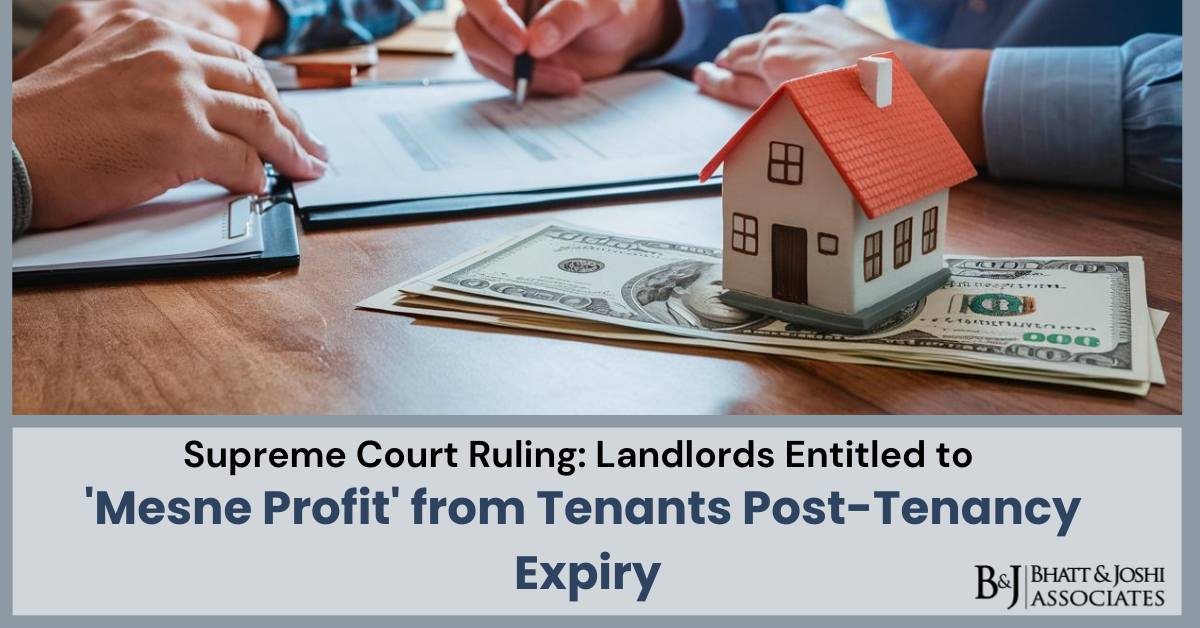Introduction
The Supreme Court of India has ruled that tenants who continue to occupy rented premises after their tenancy rights have been extinguished must compensate landlords in the form of ‘mesne profit.’ This Supreme court judgement on mesne profit underscores the legal obligation of tenants to pay for the continued use of property beyond the agreed term.
Case Background
The case before the Supreme Court involved a dispute over whether a tenant is liable to pay compensation in the form of mesne profit when there is no eviction order, yet the tenant continues to occupy the rented premises. The bench comprised Justices JK Maheshwari and Sanjay Karol.
Court’s Interpretation of Mesne Profit in Supreme Court Judgement
The Supreme Court clarified that,
“While the above-stated position is generally accepted, it is also within the bounds of the law, that a tenant who once entered the property in question lawfully, continues in possession after his right to do so stands extinguished, is liable to compensate the landlord for such time period after the right of occupancy expires.”
Definition of ‘Tenant at Sufferance’
A ‘tenant at sufferance’ is defined as a tenant who initially enters the property lawfully but continues in possession after the lawful title has ended. Justice Sanjay Karol, who authored the judgment, affirmed that such tenants are liable to pay mesne profit for the duration of their unauthorized occupancy.
Legal Precedent: Supreme Court’s Stance on Mesne Profit
Compensation for post-tenancy occupancy
The Court referenced its earlier decision in Indian Oil Corporation Ltd. v. Sudera Realty Private Limited, 2022 LiveLaw (SC) 744, where it was held that a tenant continuing in possession after the lease expiry must pay mesne profits. The Court stated,
“In our considered view, the effect of the words ‘determination’, ‘expiry’, ‘forfeiture’ and ‘termination’ would, subject to the facts applicable, be similar, i.e., when any of these three words are applied to a lease, henceforth, the rights of the lessee/tenant stand extinguished or in certain cases metamorphosed into weaker iteration of their former selves…Therefore, in any of these situations, mesne profit would be payable.”
Implications of the Ruling
The ruling has significant implications for tenants and landlords, reinforcing that tenants cannot continue to occupy property without compensating the landlord once their lawful right to do so has ended. The Court concluded,
“we may record a prima facie view, that the respondent-tenant has for the reasons yet undemonstrated, been delaying the payment of rent and/or other dues, payable to the petitioner-applicant landlord. This denial of monetary benefits accruing from the property, when viewed in terms of the unchallenged market report forming part of the record is undoubtedly substantial and as such, subject to just exceptions, we pass this order for deposit of the amount claimed by the petitioner-applicant, to ensure complete justice inter se the parties.”
Conclusion: Impact of Supreme Court’s Mesne Profit Judgement
The Supreme Court Judgement on Mesne Profit reaffirms the legal principle that tenants must compensate landlords for continued occupancy post-tenancy expiry. This decision ensures that landlords are protected from financial loss due to tenants unlawfully retaining possession of rented premises.
*Case Title: *Bijay Kumar Manish Kumar HUF versus Ashwin Bhanulal Desai














